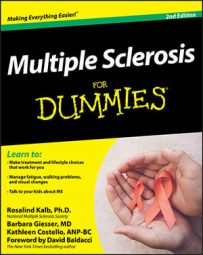Parenting is difficult enough without throwing multiple sclerosis (MS) into the mix. The following suggestions should address some of your most immediate concerns and give you some tips to handle it all:
Talk openly with your child about his or her diagnosis. It’s far better to give your child accurate information about what’s going on than to let his or her imagination fill in the blanks. The information you give also provides the vocabulary he or she needs to ask questions. Open and honest communication with kids also promotes feelings of trust.
In other words, when you feel comfortable talking about the difficult stuff, your child will feel confident that he or she is in good hands.
Be prepared for the reaction. How a child reacts to an MS diagnosis will depend a lot on his or her age. In general, however, it’s important to remember that most kids tend to take their cues from their parents. If you’re anxious or upset, for instance, your child will be too. So, the truth (provided at an age-appropriate level) is important, but so is reassurance that he or she will be okay.
Involve your child in the treatment planning process from the get-go. When kids are included in the treatment decisions they feel more knowledgeable about what’s happening, and more in control. Having youngsters feel like part of the treatment team is important because their treatment will be ongoing even when they have no symptoms.
Without plenty of discussion, a child who’s feeling hunky-dory may not understand why he or she needs to keep getting shots or taking pills. After all, who ever heard of taking medicine when you’re feeling fine?
Help your child deal with his or her doctors. Kids with MS are going to have ongoing relationships with a variety of health professionals. They’ll undergo a lot of medical tests, neurologic examinations, and evaluations of various kinds.
You can help your child feel more comfortable and less afraid in the doctor’s office if you stay calm yourself. We also suggest trying to find out ahead of time what’s likely to happen during the visit so you can give your kid a heads-up.
Also, consider helping your youngster engage in age-appropriate conversations with the doctors, nurses, and other specialists — the more comfortable your child can become with each member of the treatment team, the safer and more relaxed he or she will feel in the long run.
Teenagers may gradually feel the need to handle some of the doctor visits on their own. If your child has been able to develop a trusting relationship with the doctor, he or she may prefer to be examined and to talk to the doctor without you there.
Even though this may be incredibly difficult for you, it’s important to respect your teenager’s need for privacy. We suggest a three-way agreement among you, your teen, and the doctor that acknowledges your child’s wish for privacy and independence. But make it clear that important medical decisions will be made by all of you together.
Don’t be overprotective. Because MS is so unpredictable, your child may feel really crummy one day and perfectly fine most other days. Even though your first instinct may be to try and protect him or her from overexertion in an effort to keep the MS from doing its thing, your best bet is to let your kid be a kid.
Children’s bodies will generally give them pretty good clues about what they can and can’t do. If you have concerns about this, a three-way conversation with the doctor can help you and your child sort this out.

